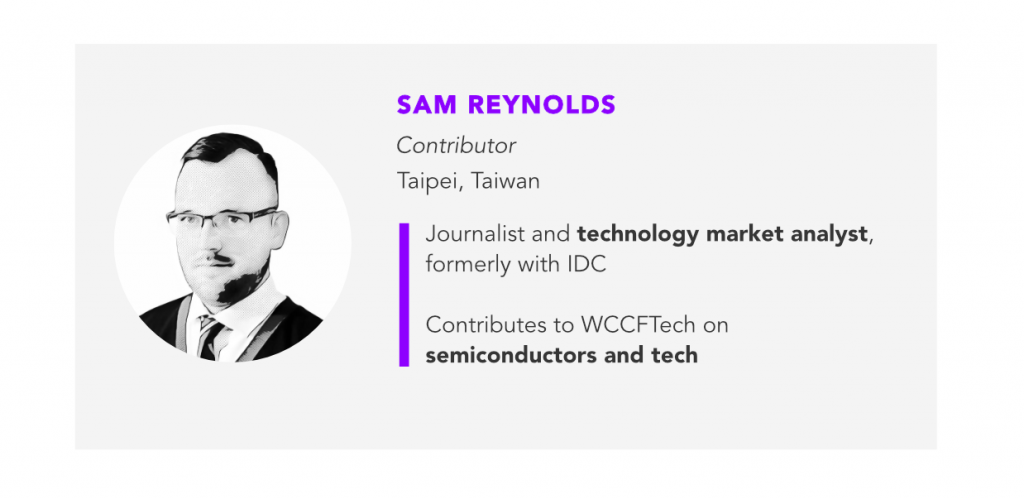
Taiwan’s Financial Supervisory Committee (FSC) has recently released guidance on STO rules. What does this mean for the regulation in Taiwan, particularly as it emerges as a hub for blockchain growth and development? Angie Lau, Editor-in-Chief of Forkast.News sits down with Sam Reynolds to learn more.
Read the related piece from Sam Reynolds: Innovation versus Conservatism: Taiwan’s Big Blockchain Conundrum
Full Transcript
Welcome to Word on the Block, the series that takes a deeper dive into the topics we cover on Forkast.News.
I’m Editor-in-Chief, Angie Lau. We’re focusing on Taiwan today to understand the role it wants to play in the global economy, and possibly reposition its own domestic economy via blockchain. Now, Taiwan just released the long-awaited regulatory language on STOs, or Security Token Offerings.
Now, why is this important? Well, it could either pave the way to elevating Taiwan’s FinTech positioning, attracting and nurturing blockchain talent and projects, or the opposite. Let’s dive deeper right now with Forkast.News correspondent, Sam Reynolds, reporting from Taipei. Welcome Sam. 0:00
Alright, set the scene for us. What has been the state of play for Taiwan as a small nation, with big tech ambitions?
Sure, so in the last few months, the FSC, which is Taiwan’s financial watchdog, published a draft of laws that they intend to use for STOs. Now just last night here in Taipei, they published the final set of laws. Now the problem right now is that these laws are quite conservative in nature. And what industry wanted halfway got there. For instance, the ceiling for the number of funds you can raise via an STO is about $30 million NTD. For most startups, that’s not sufficient for that first seed round. Industry asked that to be raised to $4M USD, but they didn’t get that request.
The good news is actually, that the FSC as allowing people to invest up to $6,000 USD. That was raised from the $3,000 mark in the first draft. So while these laws are a right step, the problem is that they are too conservative in nature. It’s great, that Taiwan has them, but they’re somewhat useful, but not that useful for industry.
So, really the question is: Why is Taiwan thinking that it needs this regulatory language? What is it trying to do as it positions itself as truly a small nation, but hit above its weight class when it comes to the global economy? 2:17
Well, so, Taiwan’s industry is based in manufacturing, but in the last two decades, that has slowed down substantially. So they want to find new areas to explore, to try and diversify away from that manufacturing base. So one of the options is, of course, FinTech. Now Taiwan’s banks are going to be quite conservative. They aren’t the giants like in Hong Kong or Singapore. That being said though, they do have a lot of cash on their books so they are paper tigers.
So in Taiwan’s case, they want to try and punch above their weight class and build for industry a set of laws that would allow people to come to Taiwan as a hub for things like STOs and blockchain, whereas Taiwan is not really known as a hub for old school finance in the big banks of the world. They do want to carve out their niche as a FinTech island to try and take the country to the next decade. But right now, with these laws for STOs, it’s a good first step, but it’s not what industry needs.
So if it’s not what the industry needs, why doesn’t Taiwan get it? 3:40
Because I think, regulators here are quite old school. It’s a very conservative place, as far as laws go. So I think they’re too concerned about people using these STOs as a vehicle for scams. Now as the audience knows, STOs are not ICOs. So STOs try and work with regulators to build a way to raise capital for startups as opposed to the ICOs, which were a wild west effectively, of capital fundraise.
So with STOs, I think they don’t quite get it because they’re still too paranoid about ICOs and about the potential for fraud, but in this case, they had gone overboard and hampered development, I believe with these laws, which don’t allow firms to raise the funds you need to for that series A.
It’s not even Series A money — I mean, at $1 million USD, to be capped at that really hampers the ambitions and the vision of a lot of these blockchain projects. You’re there, you’re talking with them, they’re in Taipei and across the country in Taiwan. What is their response? What is their feedback to you? 4:45
They are happy that they’re trying to put laws through but sad that it’s not quite the laws they want. So industry here says it’s a first baby step, but we need a first adult step. So, it’s good news that the laws are in place but they’re also looking for that first adult step. That being said, although the ceiling right now is low, I guess the intent would be that the STO is only one part of a firm’s fundraise. You have to still go through the old methods like going the VCs or investors, so and so forth.
So one thing that the FSC has mentioned is that STOs can be in the future traded on a trading desk, just for STOs, that is at the Taipei stock market. So that is actually a pretty cool initiative because that would give STOs the same kind of clout as regular stocks. So if that comes into place, which they say will happen by year’s end 2019, that would give the STO market here a legitimate face because that would put it on the same level as the regular stock market.
Is it enough to attract and keep blockchain talent in Taipei in Taiwan? 6:26
Well, it’s still a very immature market, right? So blockchain worldwide is going through that first stage of growth, right now. We’ve got rid of the scammers and the great ICO purge and it’s time for real firms, to step up and make those first steps to become in a mature company. So I do think that it’s enough to incentivize companies to get here, but not enough to really keep them.
With these new laws, Taiwan’s now on the radar as a hub for blockchain, but I don’t think it’s enough to get these serious players to stay on the island. As we said earlier, the amount you can raise with these STOs right now, is not even a Series A, it’s just barely a seed round.
So I think this will get Taiwan a lot of recognition, but it’s not enough to make the industry grow with very serious players. You might find some small startups using these laws to their advantage and fundraising that way, but anyone in the big firm will see that the ceiling is low and they won’t have the means to raise capital. But for small nimble startups, perhaps.
Yeah, the small startup culture is actually what helps the blockchain community really thrive. That’s how the talent matures and grows. I’m gonna be checking it out myself and joining you in Taiwan for the Asia Blockchain Summit where I’m going be sitting down with top regulators in the region including Taiwan and Japan, and I’m going to be asking if regulation and policy guidance has been a concerted effort. There’s a lot that we know that many in government still don’t know.
So the question is for you: How are Taiwanese lawmakers there determining the right path? Do you think conversations like that that are going to happen on stage at Asia Blockchain Summit going to help? 7:51
I think they will, for sure. We do have the Crypto Congressman, as he calls himself here, a guy named Jason Hsu. Jason is a legislator for the KMT, which is right now in opposition, and he’s been actually a big driving force in getting these laws passed by the FSC. That being said though, there’s only one Jason Hsu right? So, I think regulators here will have to look for more approval from politicians. But right now, we just have one. I think that if more politicians sign on from all parties, you’d have a good push forward.
Is it a political issue right now that is or can this be a bi-partisan issue? 9:12
Well, I don’t think right now it’s on anyone’s radar. In Taiwan, they do have there defining questions and politics of being part of China, I think right now as important as blockchain is, it just isn’t on the radar of most politicians and that’s a problem. So if industry can work to raise awareness of this, and really show politicians that this could be part of Taiwan diversification and the move towards an industry and an economy that’s not tied to manufacturing, I think they will take notice. But right now it’s a PR problem. So, you only have one politician that’s a big blockchain champion. As soon as others come on board, I think they’ll gain more traction.
What does Taiwan need to do next? What could hurt this growth and what could help? 10:08
Well, I think what could help is if we have a big concerted effort by companies to use STOs as a way to raise capital, even though the amount of capital being raised is not yet entirely useful for their seed rounds. If we do have a lot of success stories, that would definitely help things out.
Now, the problem right now is that while there’s one exchange for STOs called MAX, owned by MaiCoin in Taiwan, the other exchange it’s cross-town rival called Cobinhood recently got suspended by the local corporate registrar after they have found some issues with company infighting and directors resigning from the company. So that’s not a good look for blockchain in Taiwan, but if companies embrace STOs, I think that will help put that behind industry.
I think that if they embrace it and raise capital and show people that they are as legit as real companies with stocks, that would be great.
It’s a fascinating look into how Taiwan is really thinking about how it wants to reshape its future economy. As you’ve said, it has gone from manufacturing to the semiconductor to truly export-dependent nation, and there’s a real chance to attract blockchain talent and technology, to grow the economy. The question is of course, how is it going to do it?
So thanks for keeping an eye on Taiwan for us. Appreciate the reporting, Sam, and I’m really looking forward to sharing more when Forkast.News team lands into Taipei next week, alright, we’re gonna be bringing you a lot more coverage from top newsmakers and leaders from the world of blockchain cryptocurrency and DT. So thank you everyone for joining us, looking forward to our next meeting here on Word on the Block. I’m Angie Lau, Editor-in-Chief of Forkast.News. Until the next time.




